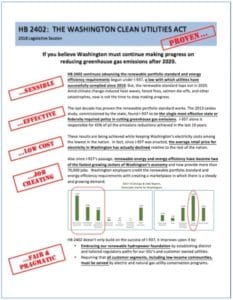Coalition supports Washington Clean Utilities Act.

Sponsored by Delegates Gael Tarleton, Vandana Slatter, Nicole Macri, Gerry Pollet, and Beth Doglio, HB 2402 will drive forward Washington’s transition to a clean energy system by:
- Continuing to advance Washington’s Renewable Portfolio Standard (RPS) for investor-owned utilities (IOUs) so that, by the year 2040, at least 50% of non-hydro power will come from clean, renewable resources. When combined with hydro, the IOUs will be more than 85% clean.
- Modifying the existing energy efficiency requirement so that all electric utilities will acquire conservation equal to at least 2% of retail sales and natural gas utilities equal to at least 1.5% of sales.
- Applying the clean energy standard to customer-owned utilities, including small utilities and market customers so that, when they need new energy, it will come from non-polluting resources.
Also, by employing different regulatory paths for investor owned and public utilities in the area of generating resources, HB 2402 effectively builds on our renewable hydropower foundation and strategically encourages renewable resource development where it’s needed.
This approach and other policy measures contained in HB 2402 will not only result in further GHG emission reductions and renewable resource development, they’ll ensure a continuing market for Washington businesses that provide energy efficiency products and services and they’ll extend the benefits of the law to all Washingtonians regardless of the utility that serves them.
At the same time, HB 2402 provides utilities with greater flexibility to meet the new RPS by recognizing federal incremental hydro upgrades as an allowable resource and by expanding the geography from which utilities can purchase eligible renewables to include all of Montana where wind and solar resources are developing.
HB 2402 also directs the UTC and the Department of Commerce to develop rules that require all electric and natural gas utilities conservation programs to serve all customer segments, including low-income communities.
The policy approach embodied by HB 2402, which emphasizes new renewable resources and energy efficiency, has already proven to be highly effective and a boon to Washington. HB 2402’s predecessor, I-937, was found by the 2013 Leidos study to be the single most effective state or federal policy at reducing greenhouse gas emissions in Washington. In all, 45% of Washington’s GHG emission reductions were attributed to I-937, which the Leidos study also found would continue to be a major contributor to emissions reductions as far out as the year 2050.
Just as impressive, these results are being achieved while keeping Washington’s cost for electricity among the lowest in the United States. In fact, since I-937 was enacted, the average retail price for electricity in Washington has declined relative to the rest of the nation.
Finally, I-937 continues to provide the impetus for growth in commerce and jobs making clean energy and energy efficiency one of Washington’s fastest growing business sectors during the last decade.
Still, we can and must do more. Beset by heat waves, forest fires, and salmon die-offs, Washingtonians want further action on climate change. The approach embodied by HB 2402 is both an environmental and an economic winner.
The NW Energy Coalition is joined in its support for HB 2402 by:
- The Sierra Club
- The Washington Environmental Council
- National Grid
- Spark NW
- The Northwest Energy Efficiency Council
- Save Our wild Salmon

